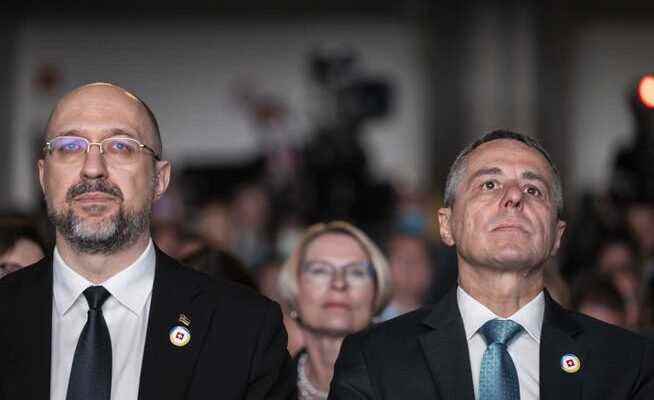Switzerland takes positive stock of the Ukraine conference in Lugano. While all states supported the declaration, two thirds of the international organizations abstained. Why?
Ukrainian Prime Minister Denis Schmihal (left) and Federal President Ignazio Cassis organized the Lugano Conference together.
Federal President Ignazio Cassis and Ukrainian Prime Minister Denis Schmihal symbolically patted each other on the back at the end of the two-day Ukraine reconstruction conference in Lugano. “We achieved what we promised,” Cassis summed up.
By this he meant in particular the so-called Lugano Declaration, which had been passed just a few minutes earlier. All 42 mostly European countries represented in Lugano support it. However, of the sixteen international organizations present, all but five abstained. The children’s charity Unicef and the International Committee of the Red Cross (ICRC) are not involved. When asked why, the latter does not answer, while Unicef says vaguely that they “will play an active role in the reconstruction of Ukraine.”
For his part, Cassis calls “technical reasons” for being offside. In order to be able to agree, organizations like the World Bank would have to consult each individual member country, which is not possible in such a short time. However, political considerations are likely to be at least as decisive: Russia is either a member of the relevant organization itself, or it is dependent on cooperation with all countries in order to be able to carry out its (humanitarian) work.
Colossal costs
It goes without saying that Russia would never sign a declaration directed against the country. In the introductory remarks, the war of aggression is sharply condemned and the aggressor is urged to immediately withdraw troops from Ukraine.
The rest of the declaration is formulated more generally: seven chapters deal with topics such as partnership, democratic participation, sustainability or even gender equality. What all the principles have in common is that Ukraine should be rebuilt differently – that is, better – if one day the guns fall silent. Particular importance is attached to the fight against corruption and for the rule of law. The Lugano Declaration should form the basis for this process, despite its non-binding legal nature.
To what extent the fine words will one day influence the hard work on the field is difficult to predict. For the time being, Ukraine is concerned with defending its sovereignty militarily. However, one thing is already clear: the reconstruction of the country will entail colossal costs. Ukrainian Prime Minister Schmihal estimates the damage suffered to date at 750 billion dollars – and with each day of the war it is increasing.
Expropriation with an educational approach
Against this background, it is not surprising that Ukraine is trying to use all means to get money – even those whose legal basis is extremely shaky, not to say non-existent. In any case, Schmihal emphasized several times at the final press conference that everything would be done to let Russia shell out part of the reconstruction.
His country is targeting the $300 to $500 billion in Russian assets that states all over the world – Schmihal called “our civilized partners” – have frozen. The Ukrainian authorities would like to use all of this money to restore schools, bridges and other infrastructure.
In plain English: The affected Russian citizens and institutions are to be expropriated. Schmihal argues with a thoroughly pedagogical approach: states would shy away from military aggression in the future if they knew from the outset that they or their rich citizens would have to bleed financially for it, explained the prime minister.
“It’s called liberal democracy”
Of course, the wish is the father of the idea, as Cassis explained to his colleague Schmihal on stage. The Swiss Foreign Minister warned that some “seriousness” was needed in this discussion. Property is a fundamental right that should not be violated just like that. “We have to ensure that the citizens are protected against abuse of power by the state – that’s called liberal democracy,” said the Federal President, unusually undiplomatic.
In short: Assets can also be frozen in Switzerland. The sanctions against Russia are currently worth $6.3 billion. However, there is simply no legal basis for confiscating this money and using it for other purposes – which does not suit all parliamentarians. Most recently, the Green Franziska Ryser submitted a postulate calling for the “use of Russian assets to rebuild destroyed infrastructure in Ukraine”. The matter should have no chance politically.
While the first delegations made their way home on Tuesday afternoon under the scorching Ticino sun, the Lugano Conference came to an end with an economic forum co-organized by the State Secretariat for Economic Affairs (Seco). Among other things, the question of how the private sector can contribute to reconstruction and which actors are involved was discussed. Because these talks were also successful, all three goals have been achieved after the Lugano declaration and the determination of the next host of the reconstruction conference, which was announced yesterday, said a proud but visibly tired Federal President.
